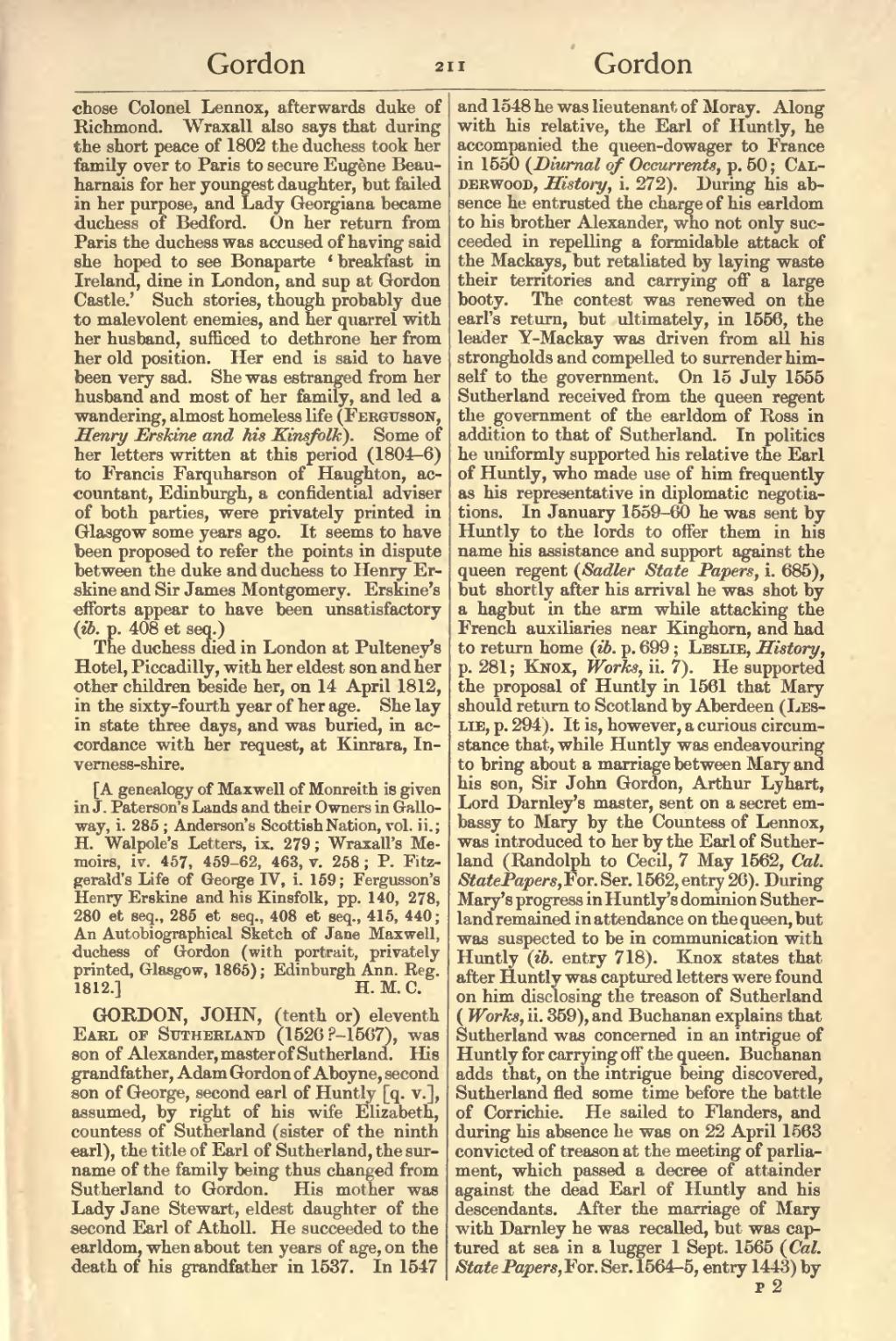chose Colonel Lennox, afterwards duke of Richmond. Wraxall also says that during the short peace of 1802 the duchess took her family over to Paris to secure Eugène Beauharnais for her youngest daughter, but failed in her purpose, and Lady Georgiana became duchess of Bedford. On her return from Paris the duchess was accused of having said she hoped to see Bonaparte 'breakfast in Ireland, dine in London, and sup at Gordon Castle.' Such stories, though probably due to malevolent enemies, and her quarrel with her husband, sufficed to dethrone her from her old position. Her end is said to have been very sad. She was estranged from her husband and most of her family, and led a wandering, almost homeless life (Fergusson, Henry Erskine and his Kinsfolk). Some of her letters written at this period (1804-6) to Francis Farquharson of Haughton, accountant, Edinburgh, a confidential adviser of both parties, were privately printed in Glasgow some years ago. It seems to have been proposed to refer the points in dispute between the duke and duchess to Henry Erskine and Sir James Montgomery. Erskine's efforts appear to have been unsatisfactory (ib. p. 408 et seq.)
The duchess died in London at Pulteney's Hotel, Piccadilly, with her eldest son and her other children beside her, on 14 April 1812, in the sixty-fourth year of her age. She lay in state three days, and was buried, in accordance with her request, at Kinrara, Inverness-shire.
[A genealogy of Maxwell of Monreith is given in J. Paterson's Lands and their Owners in Galloway, i. 285; Anderson's Scottish Nation, vol. ii.; H. Walpole's Letters, ix. 279; Wraxall's Memoirs, iv. 457. 459-62, 463, v. 258; P. Fitzgerald's Life of George IV, i. 159; Fergusson's Henry Erskine and his Kinsfolk, pp. 140, 278, 280 et seq., 285 et seq., 408 et seq., 415, 440; An Autobiographical Sketch of Jane Maxwell, duchess of Gordon (with portrait, privately printed, Glasgow, 1865); Edinburgh Ann. Reg. 1812.]
GORDON, JOHN, (tenth or) eleventh Earl of Sutherland (1526?–1567), was son of Alexander, master of Sutherland. His grandfather, Adam Gordon of Aboyne, second son of George, second earl of Huntly [q. v.], assumed, by right of his wife Elizabeth, countess of Sutherland (sister of the ninth earl), the title of Earl of Sutherland, the surname of the family being thus changed from Sutherland to Gordon. His mother was Lady Jane Stewart, eldest daughter of the second Earl of Atholl. He succeeded to the earldom, when about ten years of age, on the death of his grandfather in 1537. In 1547 and 1548 he was lieutenant of Moray. Along with his relative, the Earl of Huntly, he accompanied the queen-dowager to France in 1550 (Diurnal of Occurrents, p. 50; Calderwood, History, i. 272). During his absence he entrusted the charge of his earldom to his brother Alexander, who not only succeeded in repelling a formidable attack of the Mackays, but retaliated by laying waste their territories and carrying off a large booty. The contest was renewed on the earl's return, but ultimately, in 1556, the leader Y-Mackay was driven from all his strongholds and compelled to surrender himself to the government. On 15 July 1555 Sutherland received from the queen regent the government of the earldom of Ross in addition to that of Sutherland. In politics he uniformly supported his relative the Earl of Huntly, who made use of him frequently as his representative in diplomatic negotiations. In January 1559-60 he was sent by Huntly to the lords to offer them in his name his assistance and support against the queen regent (Sadler State Papers, i. 685), but shortly after his arrival he was shot by a hagbut in the arm while attacking the French auxiliaries near Kinghorn, and had to return home (ib. p. 699; Leslie, History, p. 281; Knox, Works, ii. 7). He supported the proposal of Huntly in 1561 that Mary should return to Scotland by Aberdeen (Leslie, p. 294). It is, however, a curious circumstance that, while Huntly was endeavouring to bring about a marriage between Mary and his son, Sir John Gordon, Arthur Lyhart, Lord Darnley's master, sent on a secret embassy to Mary by the Countess of Lennox, was introduced to her by the Earl of Sutherland (Randolph to Cecil, 7 May 1562, Cal. StatePapers, For.Ser. 1562,entry 26). During Mary's progress in Huntly's dominion Sutherland remained in attendance on the queen, but was suspected to be in communication with Huntly (ib. entry 718). Knox states that after Huntly was captured letters were found on him disclosing the treason of Sutherland (Works, ii. 359), and Buchanan explains that Sutherland was concerned in an intrigue of Huntly for carrying off the queen. Buchanan adds that, on the intrigue being discovered, Sutherland fled some time before the battle of Corrichie. He sailed to Flanders, and during his absence he was on 22 April 1563 convicted of treason at the meeting of parliament, which passed a decree of attainder against the dead Earl of Huntly and his descendants. After the marriage of Mary with Darnley he was recalled, but was captured at sea in a lugger 1 Sept. 1565 (Cal. State Papers, For. Ser. 1564-5, entry 1443) by
